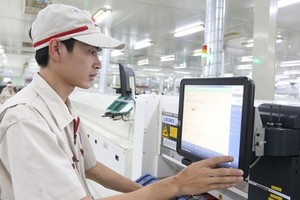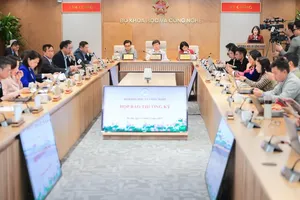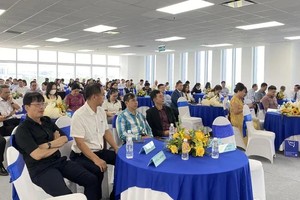
Chairman of the Ho Chi Minh City People's Committee Phan Van Mai said in an interview with Sai Gon Giai Phong Newspaper on the implementation of Resolution No. 57-NQ/TW of the Politburo on breakthroughs in science and technology development, innovation, and national digital transformation.
The development of science and technology, innovation, and digital transformation are key breakthroughs for Ho Chi Minh City's growth in the new era. Therefore, the city is closely aligned with the targets and tasks outlined in Resolution No. 57.
Among these goals, the R&D (Research and Development) Fund is expected to reach 2 percent of the GRDP by 2030, and the investment in scientific research, technology development, innovation, and digital transformation will account for 3 percent of the annual state budget, he said.
The city will strive to become one of the country’s leading digital technology industrial hubs and the top localities with science, technology, and innovation potential. The city also sets targets to rank among the top five provinces and cities with the Provincial Competitiveness Index and the top three localities with e-government and digital government indexes. Additionally, the digital economy is expected to contribute around 40 percent of the GRDP.
To mobilize all resources for breakthrough development in science and technology, innovation, and digital transformation in the coming time, Ho Chi Minh City will continue to research and update new policies, such as corporate income tax (CIT) exemption for innovative startup enterprises, personal income tax exemption for high-tech personnel, and policies to attract talents in the science and technology sector.
In the coming time, the city will consider issuing additional support policies, such as those offering financial assistance to science and technology businesses to improve product quality and develop new products, providing shared applications and workforce training programs, and co-investing or offering incentive loans to support businesses investing in R&D (research and development) laboratories, operations, research, or training activities.
Additionally, the city will offer tuition assistance and support for advanced training in digital transformation, science and technology, international training costs, attending international conferences, or participating in international research projects.
For digital transformation, the city focuses on all three pillars, including digital government, digital economy, and digital society, and strives to reach at least 80 percent of administrative procedures and documents to be addressed online by the end of 2025.
Regarding digital society, the city will complete the infrastructure for information technology and telecommunications and introduce many applications for citizens and businesses, particularly in the sectors of healthcare, education, employment, and social welfare. The southern metropolis will also pay attention to the digital economy's development, especially supporting the city’s businesses in implementing digital transformation.
Ho Chi Minh City currently has around 2,200 innovative startup enterprises, accounting for 50 percent of the total number of the country, including more than 200 venture capitals, 53 startup support organizations, and 97 universities and colleges. Over 500 startup events and nearly 80 startup competitions are organized every year in the city. In 2024, Ho Chi Minh City ranked 111th in the global ranking of cities with the most dynamic innovation startup ecosystems.
The city is urgently working with Da Nang City and the Ministry of Planning and Investment to prepare a dossier on promulgating mechanisms and policies for the financial center in the city and submit it to the National Assembly for approval. These policies are created to attract investors and various stakeholders to participate in the financial center.
Ho Chi Minh City is also planning investments in infrastructure, including transportation, energy connectivity, information technology, and other essential facilities.
























